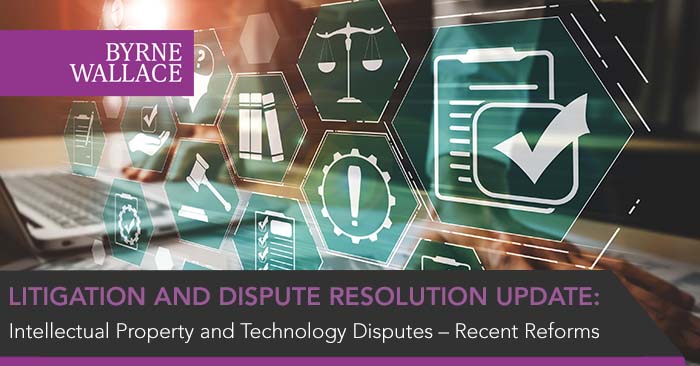Intellectual Property and Technology Disputes – Recent Reforms
Friday, 12 November 2021
The IP and Technology List
The Irish High Court has established a new dedicated sub division of the Commercial Court focused on determining matters relating to intellectual property and technology disputes.
As of 22 October 2021, organisations, as part of any application for entry to the Commercial List, may apply for entry into the new Intellectual Property and Technology List ("IP List")1. Entry to this list will be dependent on whether the Court agrees that the proceedings are “intellectual property proceedings”.
The IP List has been introduced following the recommendations in a 2020 report2 by a review group, chaired by Mr. Justice Peter Kelly, tasked with the review and reform of the administration of civil justice in Ireland.
What matters will be heard under the new List?
“Intellectual property proceedings” include actions relating to:
(a) Trade marks;
(b) Copyright and database rights;
(c) Design rights;
(d) Trade secrets;
(e) Patents; and
(f) Supplementary Protection Certificates for Medicinal Products.
The definition of Intellectual property proceedings also includes proceedings instituted in relation to unregistered intellectual property rights, proceedings for the prevention of passing off or unfair commercial practices and proceedings in respect of confidence in information.
The Judge of the Commercial List also has discretion to assign matters which involve issues of “technological complexity in any field of industry”3. However, it is not clear as to what level of complexity would be considered adequate for assignment to the IP List.
Pre-Trial Procedure
The amended process provides a detailed pre-trial procedure for proceedings in the IP List, which includes the holding of a case management conference after the close of pleadings, unless the Judge decides otherwise. The case management conference is designed to ensure that the manner in which proceedings are heard and determined are just and proportionate in all circumstances, while also conducted in the most expeditious and cost effective manner.
During the case management conference, the Judge may consider certain aspects of the case including issues relating to pleadings, interrogatories or expert evidence. In addition, the Judge may direct that the proceedings be heard on affidavit, or a combination of affidavit and oral evidence and may also direct that the proceedings be heard without discovery or with limited discovery. Given the costs often associated with the discovery process in litigation proceedings, this early judicial scrutiny as to the actual benefit of certain categories of documentation is to be welcomed.
Circuit Court Expansion
In addition, new rules regarding intellectual property disputes in the Circuit Court came into force on 12 October 2021.4
The new procedure for progressing intellectual property claims through the Circuit Court necessitates additional particulars being included in an ordinary civil bill seeking relief for infringement of intellectual property rights including, for example, the registered number of any registered intellectual property right or in the case of unregistered rights, the particulars of ownership of any unregistered intellectual property right and the specific reliefs required5. The new rules also provide details on the process for applications for the deletion of infringing signs and ex-parte applications (applications without notice to the other side) for the delivery up of infringing materials.
Having the option to pursue a claim through the Circuit Court allows SME’s and other intellectual property right holders the ability to enforce their rights without the concern of having to achieve an award in excess of €75,000 (High Court minimum threshold) which may previously have been a bar to initiating proceedings for certain SMEs.
These amendments to the Circuit Court Rules were introduced on foot of the Copyright and Other Intellectual Property Law Provisions Act 2019 (the “2019 Act”) which gave the Circuit Court jurisdiction to hear and determine intellectual property claims. The 2019 Act was viewed as an attempt to modernise copyright law in Ireland to reflect the “digital era”, giving greater rights to intellectual property holders, including easier access to remedies through the Courts. You can read our analysis of the 2019 Act here.
Comments
These recent changes to intellectual property legislation are welcome developments and reflect the evolving nature of commercial disputes in Ireland.
The development of a dedicated IP List supplements Ireland’s position as an attractive forum for the resolution of complex intellectual property and technology disputes in a timely and cost effective manner.
Separately, the amendments to the Circuit Court Rules will expand the pool of applicants in a position to enforce their intellectual property rights, as Circuit Court legal costs are typically lower than Commercial and High Court costs, thus removing a significant impediment to enforcing intellectual property rights for many SMEs in Ireland.
For further information, please contact Mark O’Shaughnessy, Colin Sainsbury or your usual ByrneWallace LLP contact.
.
1 S.I. No. 530/2021-Rules of the Superior Courts (Intellectual property proceedings)
2 Review of the Administration of Civil Justice
3 Order 63A(1)(f) Rules of the Superior Courts
4 S.I. No. 499 of 2021 Circuit Court Rules (Intellectual Property) 2021
5 Order 5D of the Circuit Court Rules

